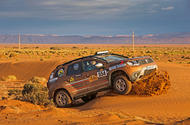Progress can be slow but you still need full throttle
The Future Terrain team is using cross country rallying to teach inspirational injured service personnel new skills
The hardscrabble town of Boudenib, the base for the opening stages of this year’s Carta Rallye, is nestled on the edge of the Sahara desert, 10 miles or so from the Algerian border in the far east of Morocco. Not that you’d know it from the weather.
As the assembled crews prepare all manner of outlandish rally-raid machinery for the seven-day, 1250-mile marathon, including Dakar-honed Mitsubishi Pajeros, spaceframe buggies and monstrous trucks, the rain is lashing down, a bracing wind is causing havoc and the desert scrubland has become a Glastonbury-esque mud bath.
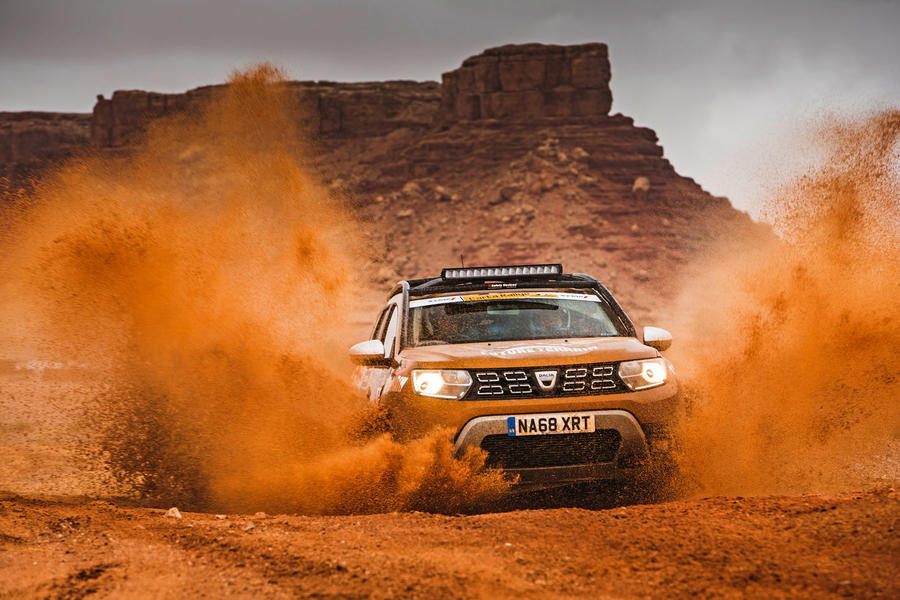
In the unexpected downpour, the spirits of the competitors are as leaden as the grey skies. But one crew stands out – and not just because, amid all the heavily modified rally cars, their three Dacia Dusters look as though they’ve been wheeled in from a showroom. They’re briskly carrying out their tasks with no regard for the rain, pausing only to trade jokes and banter.
“This is what we do,” says Scott Garthley, shrugging. “It’s just basic training for us.” Given the 14 members of the Future Terrain team are all current or former military service personnel, he’s not exaggerating.
Many of the team have severe physical injuries. Others have mental injuries, such as post-traumatic stress disorder (PTSD). Yet there are no complaints, no excuses. They’ve been preparing for the Carta Rallye for months. Rain isn’t going to stop them.
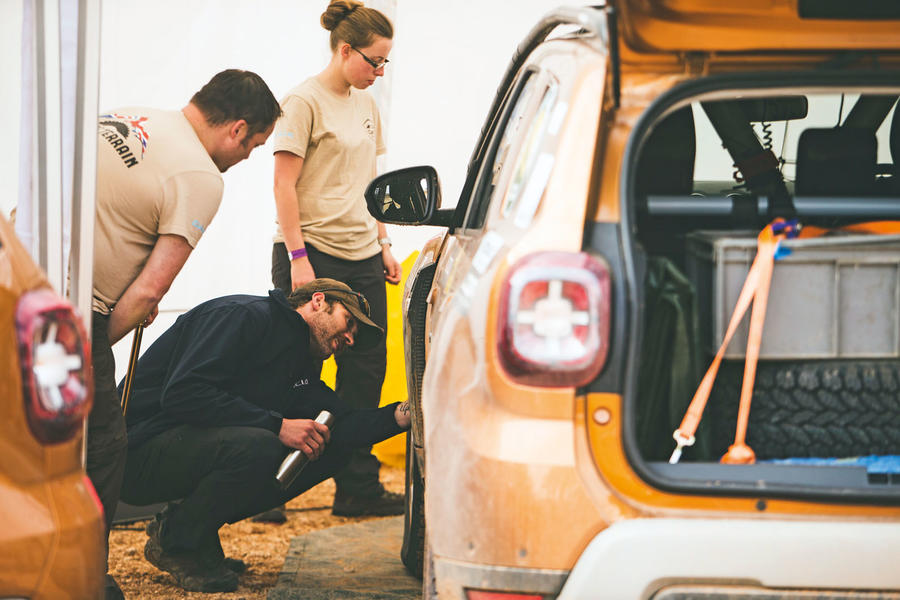
Future Terrain isn’t the first motorsport initiative for injured service personnel, or even the first rally-raid one: Race2Recovery raised money for charity by twice running a team on the Dakar Rally. Although inspired by that project, Future Terrain is very different – and that’s shown by the team’s desert orange Dusters. “We’re here for motorsport, but it’s a background to what we’re really trying to achieve,” says co-founder Grant White. “We could be doing anything, really.”
White, a former British Cross Country Championship (BCCC) competitor, helped establish Future Terrain in 2016 after meeting some of the original Race2Recovery team. At the time, BCCC crews could feature a disabled driver or co-driver. The charity successfully argued for crews made up of two disabled competitors. But while cross-country rallying is the focus, there are no Dakar ambitions. White says: “What Race2Recovery achieved by becoming the first team of amputees ever to finish the Dakar Rally was incredible, but the costs of competing weren’t sustainable. Future Terrain was inspired by their success but we want to be more accessible and put the emphasis on real-world training. We hope we’re building on their legacy.”
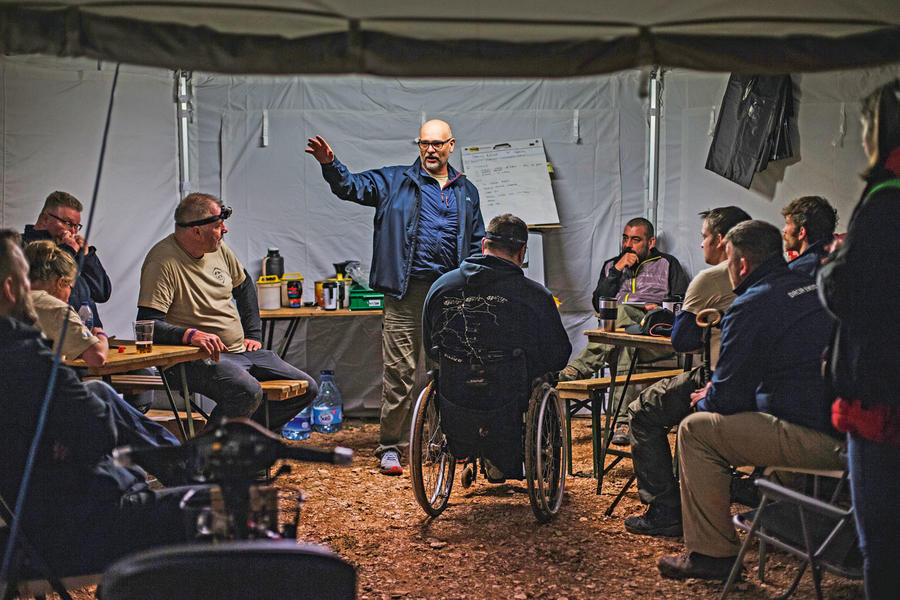
By focusing on the BCCC, initially in Land Rover Freelanders, Future Terrain could reach 40-50 veterans on a far more modest budget compared with competing in the Dakar Rally and appeal to a wider audience. The team would run one car in the event, giving passenger rides in a second.
“The driving becomes a background activity,” says White. “Where the real magic happens is in camp. It’s where people open up about their issues.”
The push beyond the BCCC came after Dacia supplied Future Terrain with four diesel Dusters. Three were ready for the Carta: one with a competition-spec roll-cage (allowing it to compete in the BCCC), two with external cages for use in demos and events such as the Carta.
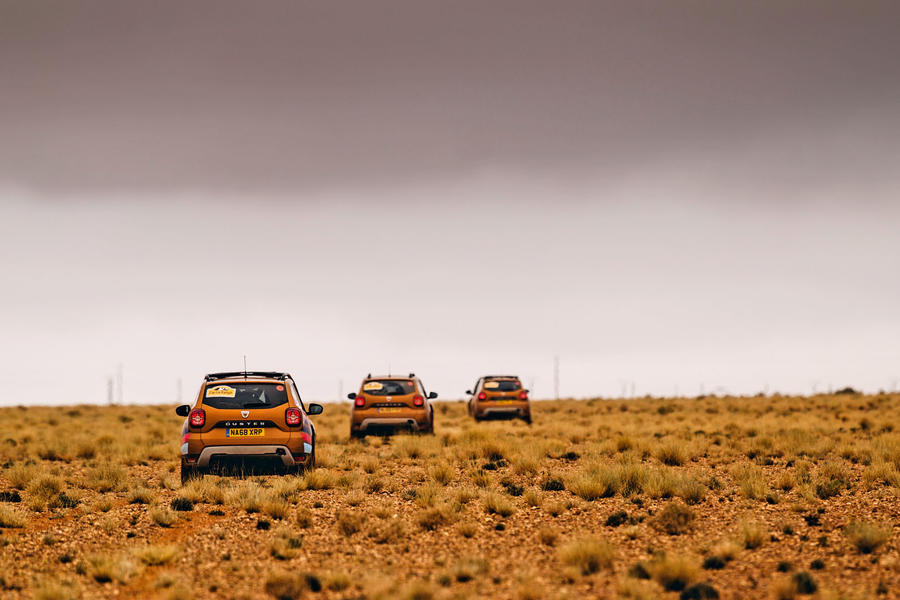
The Dusters allowed Future Terrain to expand its ambitions, but still at an accessible level: the Carta Rallye is an amateur-level event and the Dusters ran in the GPS Cup section, in which crews navigate between a series of co-ordinates within a set time. The emphasis is on navigation and reading the terrain, rather than flat-out driving. For armed forces veterans, especially in the desert environment, it’s familiar conditions.
The aim is to show veterans how the skills they’ve learned serving can be applied outside the armed forces. “Being in the military is consuming,” says White. “People define themselves by their roles. Once people leave, they need to redefine themselves and that’s not easy when you were the sniper or explosives expert.”
It’s tougher still when you have life-changing physical or mental injuries. White says the armed forces offer a “fantastic” support network, but adds such support “can re-emphasise the injury. We want to pull people away from defining themselves by their injuries.”
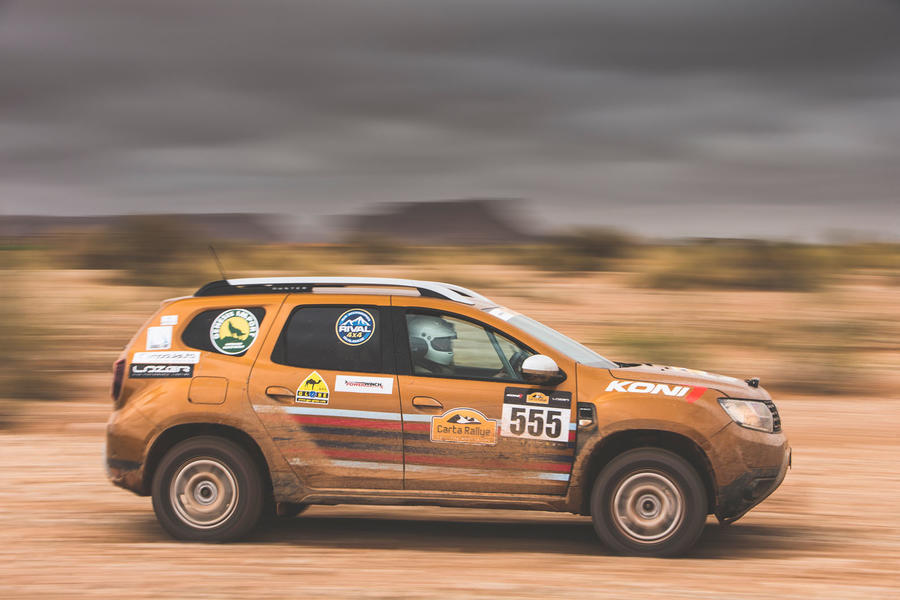
The 14-strong Future Terrain Carta team are a diverse group, with varying service histories, injuries and motorsport experience.
For example, Dan Grimes is currently in the army, and it shows. When the team encountered another crew surrounded by local kids pelting their car with rocks, Grimes jumped out to scare them off through sheer presence. Grimes joined the team after hearing about it at the Defence and National Rehabilitation Centre in Nottinghamshire, where he’s undergoing treatment for a severely injured knee and ankle. His injuries were traced to bone chips to his tibia, sustained after a fall in a military base in Germany. His injury went undiagnosed for 14 years, during which time he served in the infantry, including two tours in Afghanistan. Grimes doesn’t just look tough.
There’s Garthley, who suffered multiple injuries from a scud missile strike in Iraq in 2003. His injuries caused ongoing heart issues and recently required the amputation of a limb. Garthley has carved out a career as an HR manager but admits he was “looking for something to get involved with. The moment I saw what the team was doing, I could see the value. It’s teaching skills we can take elsewhere.”
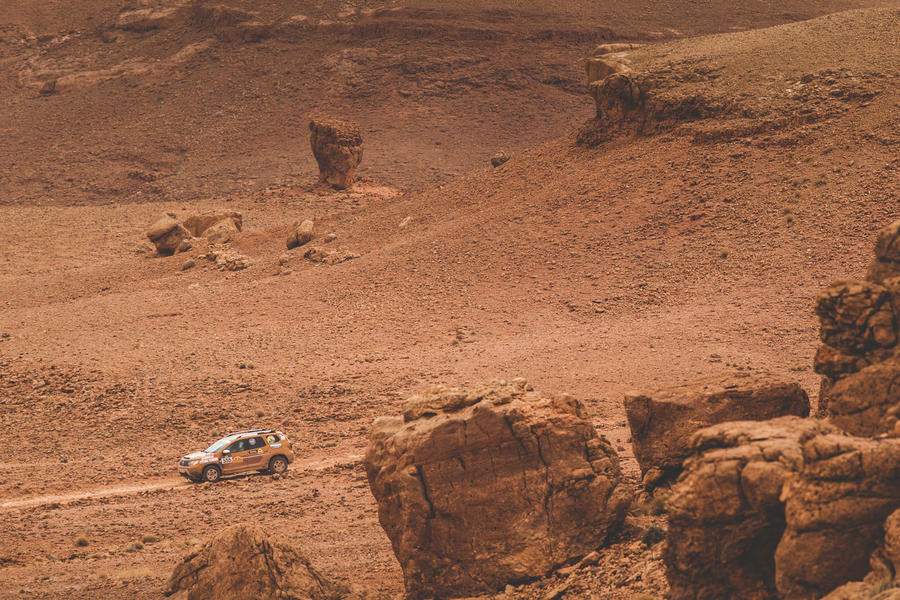
After a cold desert night, conditions are still miserable the following day for the start of the event. To share the experience, the team are three-up in the two Dusters with external cages, with two members in the third. They run together on the stage, negotiating their way through dried river beds, large rock fields and steep hills. Often, one or more team members are out of the car, guiding it carefully through. Progress is slow, but steady.
The weather improves, but the team’s luck dips. Hobbled by a damaged radiator, one Duster is forced to stop. The other two press on, but the time lost means they don’t visit all the checkpoints in time. No shame in that: only one car in the GPS Cup makes all 20 checkpoints. The lead Duster ends the day third.
It hasn’t been easy: 10 hours of non-stop, intense focus. George Frost, dealing with leg injuries and PTSD, has driven virtually the whole day. He’s exhausted but is “buzzing”.
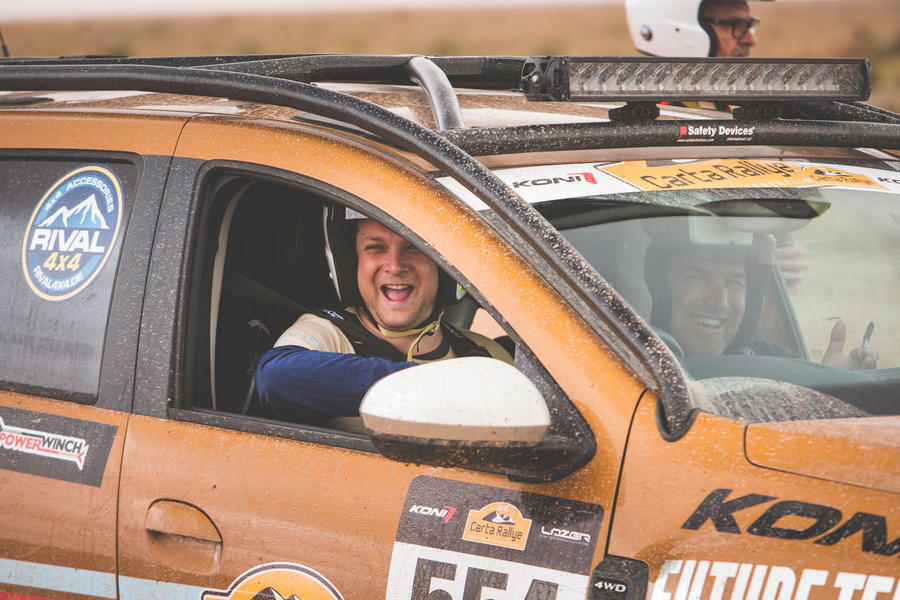
While the hobbled Duster is lowered off a recovery truck, it’s discovered one of the others also has a damaged radiator. Crew chief Sean Whatley is nonplussed. He used to fix tanks for a living. In war zones. Under fire. Bodging a fix for a Duster radiator? Easy.
The problem is the bolts holding the radiators, shattered by the force of compacted, wet mud being pushed into them. Had it been dry, it wouldn’t have been an issue.
Whatley sorts a fix, but there are no spares and going out for the second day with patched radiators risks more substantial damage. Dacia is Morocco’s best-selling car brand, but local Dusters use pre-Euro 6 diesels, with different bolts. Spares are sourced but won’t arrive for 24 hours, so the decision is made to sit out day two.
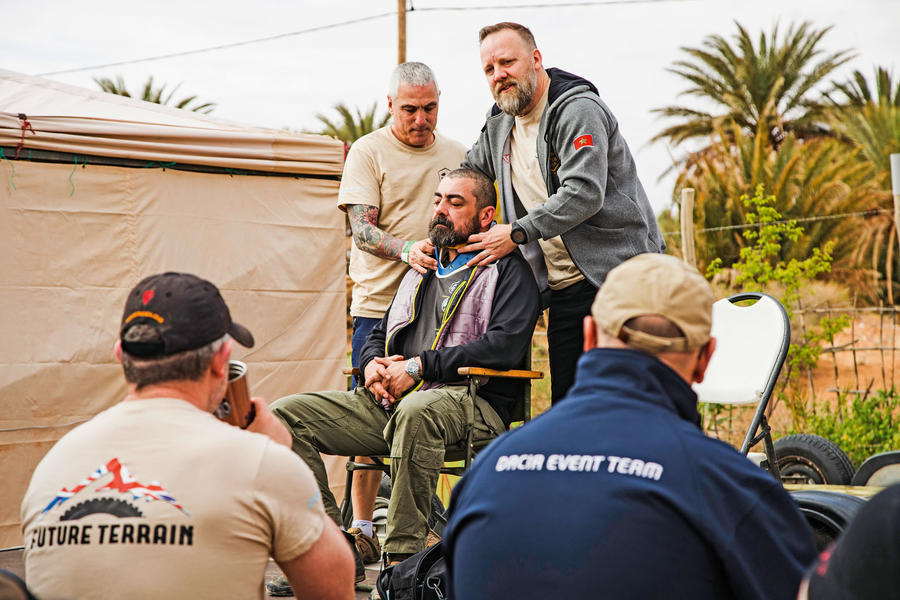
When White tells the team late that evening, there is no grumbling, no complaint. The following morning – under blue skies – the team sets to work with a renewed purpose. The cars are checked, toughened and worked on. And the team takes the opportunity to offer more training and personal development.
Ironically, it shows what Future Terrain is really all about. “We emphasise vocational training,” says White. Every crew member has done a Lantra off-road course, while many attended a Dacia technical event or did HSE-certified first aid courses. “They’re qualifications that can be used in other walks of life,” says White.
There’s also a focus on well-being, led by former Dakar team manager and military veteran turned life coach Andrew ‘Pav’ Taylor. The team are encouraged to reflect and talk about their emotions and experiences. Taylor’s lessons are shaped by his experiences with Race2Recovery. “I threw myself into it for two-and-a-half years,” he says, “but it just replaced being in the forces, and when it finished, I struggled. I still had to transition. I hadn’t learned to accept my injury.” Taylor’s role is to help ensure that Future Terrain provides members with a step into a new life.
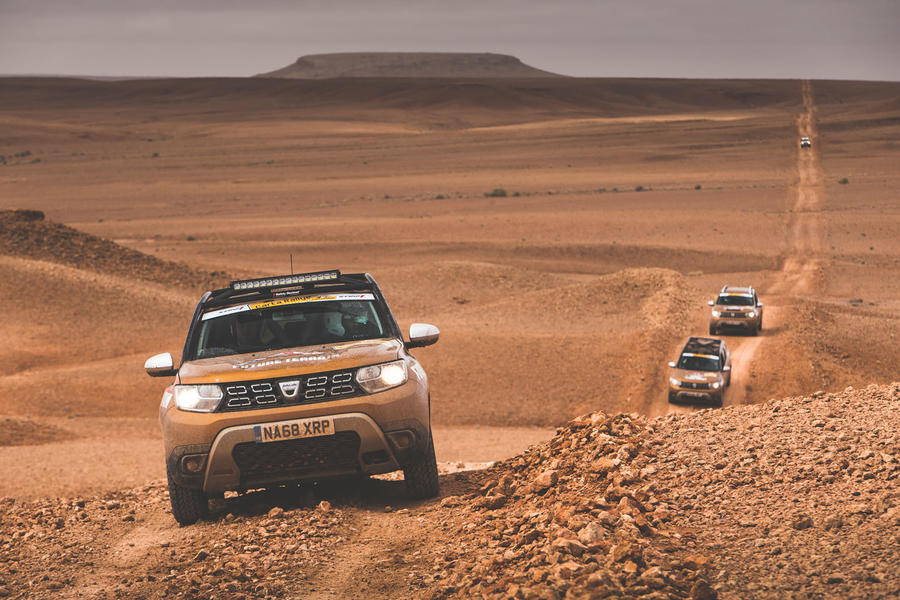
The resolve he’s charged with helping to build in the team shows. Spares sourced, the team return to action on day three, and for the rest of the event. And there is no more stopping them as they battle the elements, and perceptions – of themselves and the Dusters – to reach the finish in third, fourth and fifth places.
But White notes: “Winning a cup is not what we’re about.” It’s more important than that – and inspirational to watch.
“We have a responsibility: it’s important to show that even when you have injuries, you have value,” says Garthley. “If we can do something that inspires people, we should do something about it.”
Read more
Race, retrain, recover: driving in the lifesaving Race of Remembrance
New initiative to find motoring jobs for military veterans
Source: Autocar
